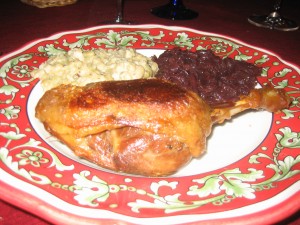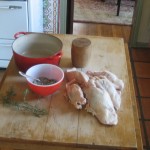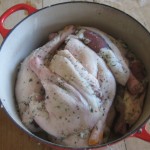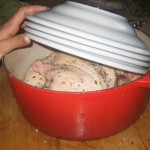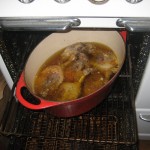It’s crazy that I would start with this recipe. But Duck Confit embodies all that I believe about food, life in the kitchen, and supping with others. It is also the very first food that Andrew asked to have for his birthday celebration. He has seen me cook it, put it away and even serve it at a dinner party. He had decided that this was a very special and desirable meal. He was absolutely right. If you like to cook, you must try this recipe. Seriously. Get your grocery list out now. I’ll wait… Are you back? Good. Now write down the ingredients you’ll need and promise yourself that you will get everything as soon as you finish reading. You will thank me if you do!
Duck Confit (or any confit) is more than a recipe. It’s a fundamental shift in how we experience our food. It’s an opportunity to practice the art of patience as it takes an excessive amount of time to get to the end product. No instant gratification here. But that’s not the point.
Desire and pleasure are products of delayed gratification. What we can’t have, we desire most. The longer it takes to get, the more pleasurable the experience is when it finally happens. This principle, once understood, can be the basis of fulfillment in many areas of our lives. One only has to look to our romantic relationships to see that this is true. The chase, the courting, the honeymoon are all relics of a past that all cultures have developed to keep things interesting. In today’s society we want it all fast and are the lesser for it. Whether it’s food or romance, we have lost the art of waiting, flirting, of letting desire build, and even commitment. This sad state of affairs has led to a rampant divorce rate and “billions served” at Mc Donalds. I’m not sure which one is worse for society.
As an antidote, I give you Duck Confit. Think of it as Karma Sutra for the palette.
Duck confit takes time, but it’s not a lot of work. The results are sublime: Earthy and tender, assertive yet gentle, sensual and pleasurable. Served strategically, the divorce rate may, in fact, decline.
Once you master duck, the same principles apply to many other types of meat and even vegetables. Originally it was a method of preserving meats for the winter larder. Done properly, most confit will last from 2 to 6 months in the fridge or cold basement if you have one. Today it’s most often experienced at a restaurant, but it will never be as good as homemade. Restaurants don’t have the time to let it sit long enough to develop its optimum flavor.
I tend to confit twice ayear. Once at the end of summer so I’ll have it for fall and winter meals and again during Lent. During Lent each year, Andrew and I give up meat. It was Andrew’s idea about four years ago and is now a treasured family tradition. The Lenten season provides us a time to examine how and what we eat in a way not normally experienced the rest of the year. However, every year I have a freezer full of meats that we can’t get through before Fat Tuesday. What I do now is take all the chicken, turkey, and pork and confit it away until after Easter. It’s a lot of slow cooking for a few days and the house smells of lard and duck fat far into lent, but the meals that come from it months later are some of our favorite of the year.
This recipe has been developed over years of trying different spices and seasonings. I find it to be versatile and one that lends itself to a wide variety of uses. The most indulgent way is to take out a piece of leg, fry it until it’s crispy, and plate it with just about any starch. Creamy mashed potatoes or polenta work well, but a pot of richly stewed navy or French flagolet beans makes for a magical pairing. You will also need some on hand to make the southern French, one pot wonder: cassoulet. And the duck fat you have left over comes in handy for braises, slow cooked onions, soups, beans, and duck fat French fries.
Now keep your promise, go shopping, and make Duck Confit this weekend! You won’t regret it. I promise.
Ingredients:
1 whole duck cut up or 6 duck legs (about 4 to 5 pounds)
Lard or duck fat (see note)
4 to 5 tablespoons Kosher salt
Lots of freshly ground pepper (a tsp or more to taste)
1 tablespoon fresh thyme (or 1 tsp dried) chopped
2 teaspoons fresh rosemary or 1 teaspoon dried
a couple of bay leaves, crushed up
2 cloves, ground with a mortar and pestle
1 or 2 cloves garlic, minced
1/3 cup water
If you are using a whole duck, cut the duck up into serving pieces. If it comes with the heart and gizzard and you are so inclined… keep it handy. Remove all the excess fat from the carcass and save it for a bit later.
Mix all the herbs, salt, pepper, garlic, cloves, and bay leaves. You can either chop them up all together or grind them a bit with a mortar and pestle. Rub this mixture all over the duck pieces (even the heart/gizzard if you dare) and put all the pieces into a bowl. I like to use a bowl that will fit my plates on top and I put a few on top to weight it down. (See photo) cover the whole thing with plastic wrap and pop it in the fridge for 24 to 48 hours. I like a stronger flavored and saltier confit, so I let mine go for the 48.
Now take all the excess duck fat, cut it up into pieces and put it in to a pot with the water and either put it in an oven at 300 for a few hours or slowly cook over low heat for 45 minutes to an hour to render the fat. You will be left with crispy duck skin and beautifully clear duck fat. Strain the fat and refrigerate until ready to use in a couple of days. Salt the cracklings and serve them on a salad or pamper your dog!
After a day or two, uncover the duck pieces and rinse them in warm water and dry with a paper towel.
Heat your rendered duck fat in a pan large enough to hold all the pieces. I like to use a large deep sauce pan or a large Dutch oven. Add the duck to the pan and saute for about 10 minutes to render more fat. You may have rendered enough fat to cover the duck, but most likely you will have to add lard to bring the level of fat to cover the duck pieces. Turn down the heat and gently simmer the duck for about 1 1/2 hours or more. You have to feel this out a bit. You want the duck to be soft, succulent, and ALMOST falling off the bone. However, you don’t want it to actually get to this point, as it makes cooking it later on more difficult. I have missed this point on more than one occasion and it’s not a disaster. It’s just that you want to be able to pull out a piece months later and fry it up in a pan in one piece. If you do over cook, you will have wonderful confit for salads, cassoulet, and other wonderful.
Once the confit is ready, take it out of the oven and remove the duck to a cookie sheet or plate to cool. Strain some of the fat (about an inch) into the container in which you are going to store the confit in. Leave it in the fridge to solidify while you let the duck cool. I like ceramic crocks, but wide-mouth glass jars work well too. When the duck is cool, place it in the container and strain the rest of the fat into the containers to completely cover the duck. At this point you can top it and place it in the fridge. If you used a clear jar, wrap it in butcher paper, tie it up with a string, and place it in the fridge. Now comes the hard part. Don’t touch it for at least two weeks. I usually leave it for a couple of months and often go longer.
When you are ready to use it, take it out of the fridge and set it aside for a couple of hours or set it in a gentle bath of warm water. This will allow you to pull the duck out of the fat without damaging it. Now you can use it as you want. My favorite way is to fry it up skin side down, until it’s very crispy. The contrast between the crispy skin and succulent tender meat is heaven. The left over fat should be strained and used throughout the year for duck fat roasted potatoes, braising onions, even seasoning your cast iron. You get the idea. Provecho!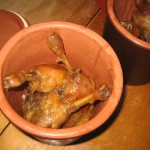
You have to forgive the photo placements. I am sure I’ll figure out Word Press soon enough.
